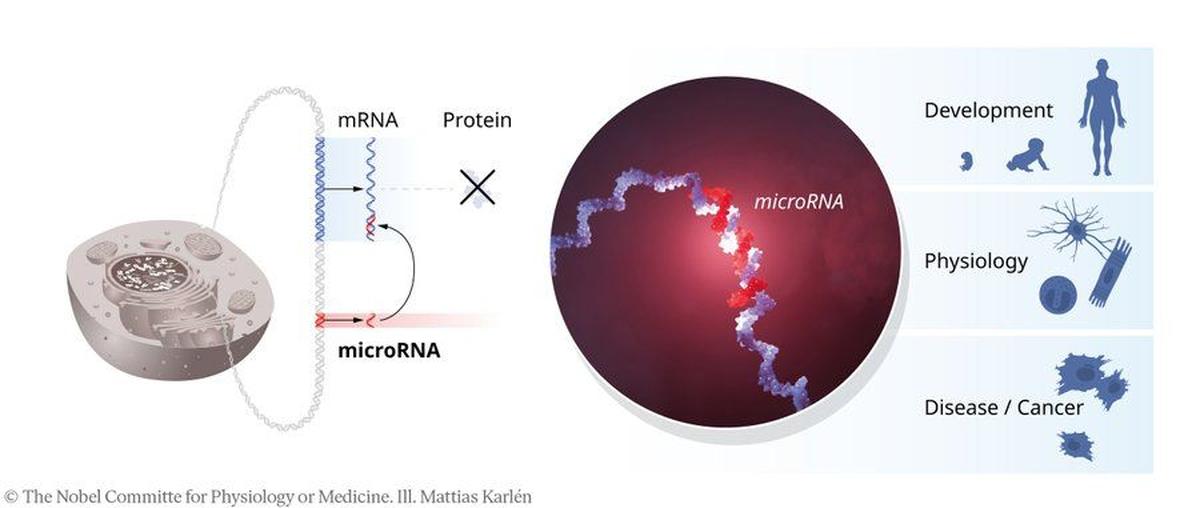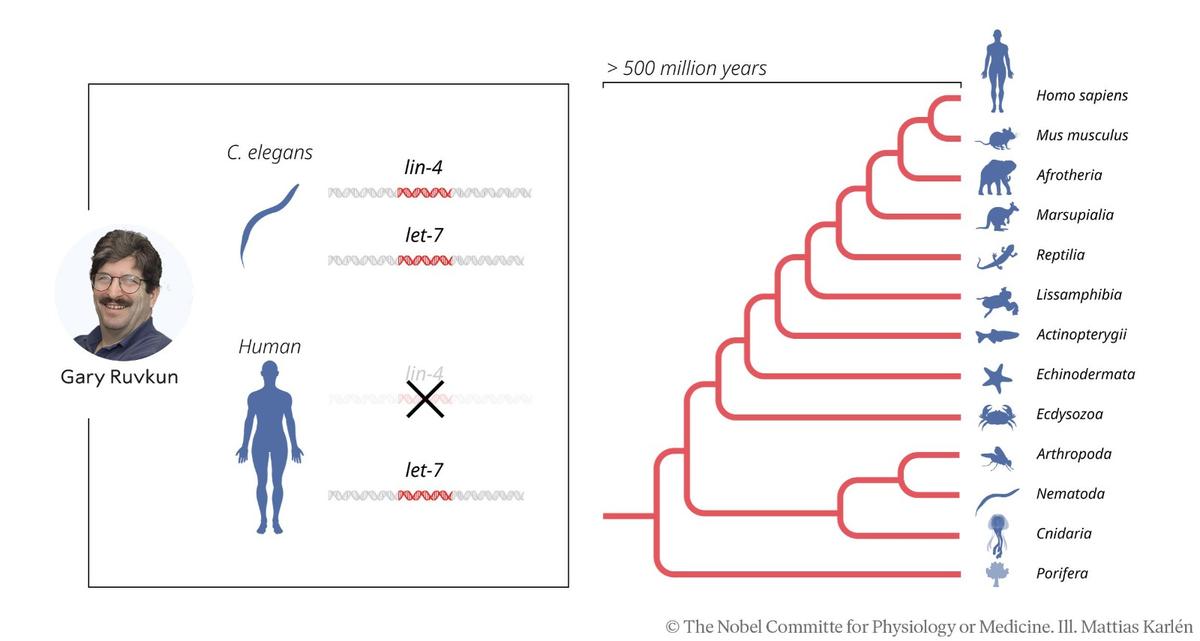
Victor Ambros (L) and Gary Ruvkun (R) were awarded the prize for the discovery of microRNA and its role in post-transcriptional gene regulation.
| Photo Credit: AP
Victor Ambros and Gary Ruvkun have been jointly awarded the Nobel Prize for Physiology 2024, the Nobel Academy at the Karolinska Institutet announced on Monday (October 7, 2024).
They were awarded the prestigious prize for the discovery of microRNA and its role in post-transcriptional gene regulation.
“Victor Ambros and Gary Ruvkun were interested in how different cell types develop. They discovered microRNA, a new class of tiny RNA molecules that play a crucial role in gene regulation,” The Nobel Assembly said in a press statement.
Both Ambros and Ruvkun are American biologists. Ambros currently works at the Programme in Molecular Medicine at the University of Massachusetts in the U.S. Ruvkun is a professor of genetics at the Harvard Medical School and researches microRNA and RNA interference mechanisms at the Ruvkun Lab at Massachusetts General Hospital.
Ambros and Ruvkun’s groundbreaking discovery revealed a completely new principle of gene regulation that turned out to be essential for multicellular organisms, including humans, the Nobel Assembly said.

“Understanding the regulation of gene activity has been an important goal for many decades. If gene regulation goes awry, it can lead to serious diseases such as cancer, diabetes, or autoimmunity,” the Nobel Academy said. Photo: The Nobel Committee for Physiology or Medicine. Ill. Mattias Karlén
“Their surprising discovery revealed an entirely new dimension to gene regulation. MicroRNAs are proving to be fundamentally important for how organisms develop and function.”
MicroRNAs, or miRNAs, are small, non-coding molecules of RNA. They are typically around 19-24 nucleotides long and play an important role in determining how much messenger RNA (mRNA), which carries genetic information, eventually gets translated into protein.
Protein synthesis is a multi-step, complex cellular process that occurs in two stages – transcription and translation. In the transcription phase, the gene’s DNA sequence is copied into mRNA in the cell nucleus. The mRNA then enters the cell fluid and attaches itself to the ribosome which is the site of protein synthesis. Translation step is next, where another type of RNA, transfer RNA (tRNA) molecules bring specific amino acids to the ribosome where they are linked together in a particular order as instructed by the mRNA, resulting in the formation of protein. The mRNA acts as a template for protein synthesis during this step.
MiRNAs act between the transcription and translation steps, thereby regulating the final production of protein. Even though the genetic information stored in our DNA is the same in different cell types, these cells are capable of producing unique kinds of proteins and thereby perform specialised functions, which is possible because of miRNAs.

“MicroRNA genes have evolved and expanded within the genomes of multicellular organisms for over 500 million years. Today, we know that there are more than a thousand genes for different microRNAs in humans, and that gene regulation by microRNA – discovered by this year’s medicine laureates – is universal among multicellular organisms.”. Photo: The Nobel Committee for Physiology or Medicine. Ill. Mattias Karlén
While their area of research is similar, Ambros and Ruvkun haven’t worked together since they were postdoctoral fellows in H. Robert Horvitz’s laboratory, who won the 2002 Nobel Prize in Physiology or Medicine. “After that, they set up their own labs and worked on different aspects of microRNA regulation. Ambros was the first one to clone a microRNA and Ruvkun cloned the second one…they haven’t collaborated a lot after their postdoctoral work as much as I know…but they did [share some data] and that was the key to this Nobel Prize,” Olle Kämpe, member of the Nobel Committee for Physiology or Medicine 2024, said in an interview after the prize announcement.
Gunilla Karlsson-Hedestam, chairperson of the Nobel Committee for Physiology or Medicine 2024, said that although there are no clear applications of miRNAs yet, understanding them is the first step towards further research.
Last year the Nobel Prize for Physiology was jointly awarded to Katalin Karikó and Drew Weissman for their “discoveries concerning nucleoside base modification that enabled the development of effective mRNA vaccines against COVID-19”,
Also read: The Nobel Prize 2024 — an interactive guide
The Prize for Physiology or Medicine kicks off a week of Nobel Prize announcements. The winners for Physics will be announced on October 8, followed by Chemistry on October 9. The winners of the Literature, Peace and Economic Sciences Prize will be declared on October 10, October 11, and October 14 respectively.
The prizes carry a cash award of 10 million Swedish kronor (nearly $900,000) and will be awarded on December 10.
Also Read:2023 Nobel Prize in Medicine or Physiology: What are mRNA vaccines and how do they work? | Explained
The Nobel Prize was created by wealthy Swedish inventor Alfred Nobel, who in his will dictated that his estate should be used to fund “prizes to those who, during the preceding year, have conferred the greatest benefit to humankind”.
Published – October 07, 2024 03:03 pm IST




